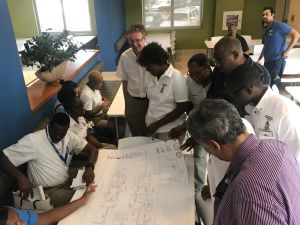
Participants in the workshop review building plans
(CNS Local Life): Last month 18 environmental health professionals from the Department of Environmental Health (DEH) and Water Authority-Cayman took part in a two-day training session on “Legionellosis: Risk Management for Building Water Systems”. The DEH Laboratory organised the session, held 16-17 July at the University College of the Cayman Islands. Ruth Otero and Armando Chamorro, environmental consultants from Florida-based CIH Environmental Solutions, presented the workshop.
“Legionellosis, otherwise known as Legionnaires’ disease, is a serious and potentially fatal form of pneumonia which is a lung inflammation caused by infection,” said DEH Laboratory Manager Antoinette Johnson in a DEH press release. “The incidence of the illness has been increasing worldwide and it is important that local environmental health professionals be properly informed about how to effectively inspect and educate on this issue which has implications for the Cayman Islands tourism product.”
Legionellosis is a reportable disease under the International Health Regulations and in recent times, there has been heightened attention to what is known as Tourism-Associated Legionnaires’ Disease (TALD), the DEH said in the press release. This refers to an instance where a country has shown up in the travel history of a visitor who has been diagnosed with Legionnaires’ disease upon their return home. In the Cayman Islands, once the presence of the legionella bacteria is suspected, the case will be referred to the DEH for testing and recommendation.
Outbreaks and sporadic cases have occurred in buildings such as hotels, hospitals, nursing homes and cruise ships around the world. Although cases of TALD have been rarely linked to Cayman, the DEH has begun to take the necessary steps to ensure that the Islands have the ability to reduce the risk of, properly assess and remediate against legionella, should the need arise.
The two-day session offered classroom instruction and practical assessments of water sources in buildings which allowed participants to apply their newly acquired knowledge.
Participants learned how to identify where Legionella propagates, who is at high risk for Legionellosis and how to create a workable Legionella water-management plan, the release said. Those attending were also taught how to use the most recent set of guidelines published by the American Society of Heating, Refrigeration and Air-Conditioning Engineers.
The risk of Legionella can be reduced through the design, maintenance and operation of water services under conditions which prevent or control the growth and multiplication of the bacteria, along with the meticulous cleaning and disinfection of all water systems, the DEH said.
For more information on legionella, call the DEH laboratory at 949-6696 or email Antoinette Johnson


Interesting article. Legionella has been popping up a bit more the last few years and it’s interesting to see how people are treating it. One method I’ve been following is Ultraviolet LEDs. UV light can kill bacteria but conventional lamps tend to be ill adapted to treating Legionella due to their size and cycling times. UV LEDs can turn on instantly and can fit in places so you can treat the water or mist right at the point of use or just before creation of the mist. This article explains UV LEDs more https://www.aquisense.com/legionnaires-disease
Meanwhile Water Authority have a serious problem with sludge (biofilm) in their distribution system. How did it get there? Well all the pipe breaks they’ve had over the last 30 years have allowed silt and muck into the system during the repair process. This sludge harbors microbes such as E. Coli, Legionella and others responsible for human infections. What is Water Authority’s initiative to reduce and mitigate sludge in the water distribution system and how are we to be assured that any microbial contamination in the system is being effectively treated?